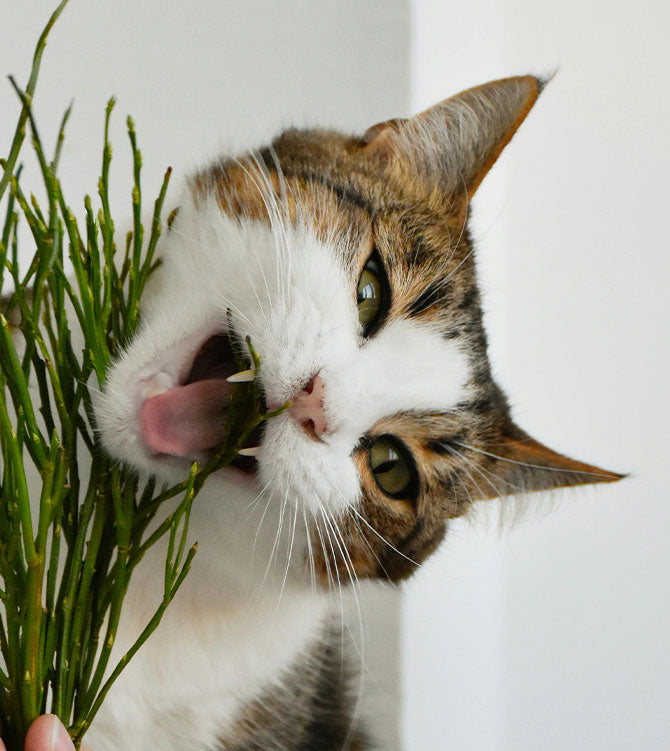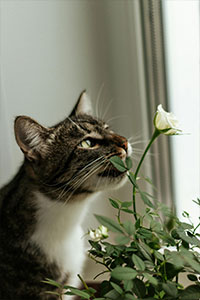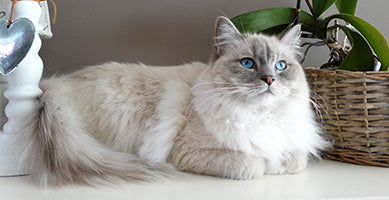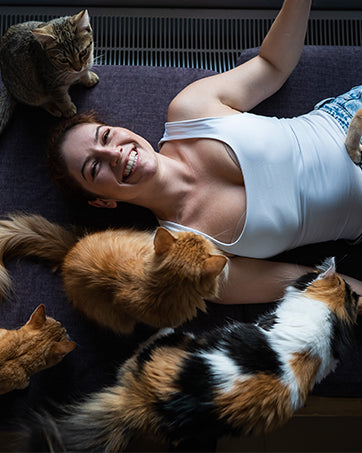Jessica W. Kelvin - Mar.05.2024
Why Do Cats Eat Grass?
7 Insights into Feline Behavior

How Many Times a Day Should a Cat Poop?
Est. read time: 10 min.
IIf you’ve never had a cat, you might wonder how often they go to the bathroom. However, the question that cat parents should be asking is, how often should cats poop? As with people, those two answers are different for every individual and sometimes vary enough to warrant medical attention.
How often your cat goes to the bathroom, what their poop looks like, and even what it smells like can indicate what’s normal and what’s not. Learn more about what’s normal when it comes to cat poop and when you may want to reach out to a veterinarian.
How often should cats poop?
There’s no one-frequency-fits-all solution to this question, but a general rule of thumb is that pooping once or twice daily is considered normal for cats. What your cat consumes in a day and how much activity they get might alter just how fast they digest on any given day.
Kittens tend to poop more often than adult cats, so as your cat ages, they will begin to poop less and less. Other factors that impact your cat’s frequency include diet, activity level, medications or supplements, and underlying medical conditions.
If you suspect something might be wrong because your cat’s bowel movements have changed, consider contacting your veterinarian to set up an appointment to check for any health issues.
Factors that can affect a cat’s bathroom habits
All cats have different bowel movements, and you’ll likely figure out what normal looks like for your cat. When something is abnormal, you may be quick to point it out.
Below we will discuss six factors to consider when wondering about your cat’s bowel movements:
Age
Kittens are not born with the knowledge of how to control their bowel movements, similar to human babies. Until a certain age, your kitten is likely to go more frequently throughout the day until they learn how to control and get into a habit of going. Additionally, when kittens transition from their mother’s milk to cat food, this can also affect what your cat’s stool looks like, as well as the frequency.
Water intake
A cat that is not drinking enough water may have more irregular bowel movements. Water helps lubricate the gut and move stool along so it can pass easily. Monitor your cat to ensure they are getting enough water, especially if you notice irregular bowel movements.
While kittens drink their mother’s milk, older cats need water. If your cat seems hesitant to drink the still water in their dish, consider a running water fountain for them. Their food type can also affect hydration levels. Wet food is more hydrating. If your cat eats dry kibble, consider sprinkling it with water or some cat-friendly broth.
Diet
Cats that have recently changed their diets may need time to adjust. It is always recommended that diet changes be gradual over several days if feasible. When this is not possible, and sometimes even when it is, diarrhea and constipation can occur. Sometimes the diet that your cat is enjoying won’t have enough fiber, which may make passing bowel movements more difficult. Making light adjustments to your cat’s diet can greatly impact the frequency in which they go.
General health and health problems
A sick cat may experience gastrointestinal distress until they’ve been treated. Intestinal parasites, hyperthyroidism, irritable bowel disease, and chronic kidney disease are a few of the conditions that could be to blame.
Additionally, some medications your cat may be prescribed can irritate their digestive system, causing an upset stomach.
Activity level
More active cats often have quicker metabolisms and can digest foods faster. This usually makes going to the bathroom easier, meaning your cat may go multiple times a day.
Environmental factors
Depending on what is going on in your home life, your cat may be experiencing more stress than usual. This can cause diarrhea or constipation and can be resolved if you fix whatever is stressing your cat. Sometimes moving or bringing a new pet into the home is also one of the common causes of gastric distress.

What does normal cat poop look like?
It may not be glamorous, but checking in to see what you’re scooping out of the litter box (or what your self-cleaning litter box is scooping for you) is often smart. How can one identify abnormal poop effectively if they are unsure what normal is?
It’s usually very noticeable when something is wrong with your cat’s poop. Healthy cat poop, as seen in the image below, will appear sausage-shaped, dark brown, and firm yet pliable.
Abnormal cat poop might appear as:
-Small, rock-hard, and excessively dry
-Lots of hair mixed in
-Thin, ribbon-like
-Black, tarry, or runny
-Soft, frothy, or mucousy
If your cat’s abnormal poop is paired with other symptoms, contact their vet to set up an appointment as soon as possible. They may even ask you to collect a stool sample to bring with you when you go. On top of having irregular stools, collecting a poop sample in-hospital requires rectal palpation, which can add additional stress to an already stressful situation.
Irregularities to look out for
If you notice your cat making frequent trips to the litter box, first verify whether your cat is actually “going.” For instance, if your cat is straining to defecate, this could indicate a number of medical issues that warrant a veterinary visit, such as constipation or inflammatory bowel disease (IBD). And if your cat is just plain going a lot, it could be a sign of stress and anxiety.
Looking for an easy way to keep tabs on your cat’s litter box habits? VIVIDMOO, a WiFi-enabled, self-cleaning litter box, has a smartphone app that allows you to monitor how often your cat uses the litter box. A spike in litter box activity—whether your cat is urinating more, defecating more, or straining to do anything at all—indicates that a trip to the vet is a must.
Cats:Theobromine Toxic Consumption
Most Cats: 1-10 lbs(0.45-4.6 kg), Large Cats11-25 lbs(5-11.4 kg)
Cacao Beans: Most Cats> 0.05 oz, Large Cats> 0.5 0z
Unsweetened Baking Chocolate: Most Cats> 0.2 oz, Large Cats>2 0z
Dark Chocolate: Most Cats> 0.5 0z, Large Cats>7 oz
Milk Chocolate: Most Cats>1.5 0z, Large Cats>16.5 0Z
White Chocolate: Most Cats>360 oz, Large Cats>4000 0z
Cocoa Powder: Most Cats> 01 0z, Large Cats>10z
Cocoa Bean Mulch: Most Cats>0.1 0z, Large Cats>1 0z

Showing making procedure is a good way to guarantee product quality
Stress Relief
Eating grass can also serve as a form of stress relief for cats, providing a calming activity that distracts from anxiety or boredom.


Get customer attention by clean visual and video
Instinctual Actions
Grass eating is an instinctual behavior that may stem from a cat's need to seek out alternative food sources or to induce vomiting to clear their stomachs of indigestible materials.
Going every few days
According to veterinarian Dr. Justine Lee, cat constipation can be an uncomfortable, chronic problem in felines. Constipation is more common in middle-aged (8 or older) and senior cats. Left untreated, constipation in cats can lead to an enlargement of the colon—which is difficult and costly to treat.
How long can a cat go without pooping?
If you notice that your cat only poops every two to four days, strains to poop, or takes an unusually long time in the litter box, make an appointment with a veterinarian.
Constipation can be especially dangerous for very young kittens. If your kitten hasn’t pooped in three days, get to a veterinarian to check for blockages and other issues.
Article credit: Heidi Cohen (https://heidicohen.com/use-blog-to-sell/)
Digestive Aid
Grass acts as a natural laxative, helping cats pass hairballs or other indigestible items through their digestive tract more easily.
Elimination of Parasites
It's also theorized that grass eating may help cats eliminate intestinal parasites, although this benefit is more anecdotal than scientifically proven.
Home remedies for cat constipation
There are many ways to treat cat constipation at home. Simple dietary changes include transitioning to high-fiber kibble (this typically requires a prescription from your veterinarian), trying a pet water fountain to increase your cat’s hydration, or adding 1/2 teaspoon to 1 teaspoon of canned pumpkin to your cat’s diet daily.
Safe laxatives like oral psyllium products (such as Metamucil, 1-4 teaspoons per meal) can be mixed into canned food, although not all cats will eat this mixed in their food. Another option is the laxative MiraLAX® (polyethylene glycol); this can be given at ¼ teaspoon every 12 hours as a starting point, but can be increased based on guidance from your veterinarian. It is best to check in with your veterinarian prior to giving your cat any over-the-counter medication to ensure appropriate dosing and frequency before deeming a treatment option unsuccessful.
Never give an over-the-counter enema to your cat without consulting your veterinarian.
Overly frequent bowel movements
While going regularly is ideal, some cats may seem to poop more frequently than they should. There might be an underlying medical condition that needs attention from a vet or stress that needs to be treated.
Other factors include:
-Change in diet
-Allergies to food or food intolerance
-Parasites
-Bacterial infections or imbalances
-Anxiety
-Toxins
-Inflammatory bowel disease (IBD)
What if my cat has diarrhea?
Cat diarrhea isn’t uncommon, but it’s also not something to ignore. Diarrhea in kittens and senior cats is especially a concern, as they are quicker to succumb to dehydration. Diarrhea that lasts longer than 48 hours in any cat warrants a vet visit.
Some causes of diarrhea in cats include:
-Food intolerances or allergies (cats generally don’t tolerate dairy, for instance)
-Toxic substances consumed (plants, herbs, garlic, onion, etc.)
-Inflammatory bowel disease
-Gastrointestinal worms
-Pancreatitis
-FIP
-Colitis
-Lymphoma
Blood in stool
Don’t panic if you notice a little blood in cat poop. While it’s not normal, it could simply be an instance of your cat straining too hard to poop. However, if you notice a lot of blood, or if blood makes a regular appearance in the litter box, make an appointment with your cat’s veterinarian immediately. Blood in cat poop can be caused by the same underlying issues that cause diarrhea, such as IBD, worms, food allergies, cancer, or even life-threatening bowel obstruction.
Something protruding from their behind
Contact your veterinarian immediately if you see something coming out of your cat’s behind that is not identifiable or clearly feces. While it may seem appropriate to assess the situation thoroughly before deciding to pull it out, this can be very dangerous without knowing what it is or what it is attached to. Sometimes pulling can do more harm than waiting for an exam at the veterinarian. It could be string, a stick or piece of grass, dental floss, or even hair.
In general, you don’t want to pull out this string yourself. It could be wrapped around the cat’s intestines or other internal organs, so contact your vet immediately for advice on how to proceed.
Abnormal stinkiness
Finally, one last factor when it comes to cat poop: How stinky is too stinky? Of course, there will be some degree of odor when dealing with feces, but anything downright foul or any change in odor (including the level of stinkiness) should be brought to your vet’s attention. Extremely smelly cat poop could be a sign that your cat’s diet needs to change or that your cat has some illness or infection.
If you’re dealing with a “normal” degree of litter box odors but still can’t stand the smell, consider a litter box that’s made with odor control in mind—like VIVIDMOO.
When to take your cat to the vet
When you notice a change in your cat’s pooping behaviors, it’s probably safe to call your vet and ask what they think. They will know best about what you should do and might advise you on how to help your cat before bringing them in. Chatting with your veterinarian and getting their opinion will give you some peace of mind.
Changes in bowel movements don’t always warrant an emergency, but it’s best to be safe!
Sources:
-Diarrhea in Kittens | NCBI
How to Safely Introduce Grass to Your Cat
Suitable Types of Grass
Certain types of grass are more beneficial and safer for cats, including wheatgrass, which is often sold as "cat grass."
Growing Your Own Cat
Grass
For the safety and health of your cat, consider growing your own cat grass at home. It's a simple and effective way to ensure they're getting a safe product.
Alternative Behaviors and Solutions
Dietary Supplements
If your cat shows an excessive interest in eating grass, it might indicate a dietary deficiency. Consult with a veterinarian about supplementing your cat's diet.
Behavioral Enrichment
Providing toys, climbing structures, and engaging activities can reduce your cat's inclination to eat grass by offering alternative forms of stimulation.
Why Do Cats Eat Grass?
Exploring the curiosity behind this behavior reveals a complex blend of nutritional, psychological, and instinctual factors. Understanding these can help cat owners provide better care and enrichment for their feline friends.
Owner Experiences and Advice
Personal Anecdotes
Many cat owners have observed their pets eating grass and have noted the benefits or concerns that came with it. Sharing these experiences can offer valuable insights for other pet owners.
Expert Recommendations
Veterinarians and animal behaviorists can provide professional advice on managing grass-eating behavior, ensuring it remains a safe and positive experience for your cat.
FAQs
Cats should not eat chocolate ice cream; not only is chocolate toxic to cats, but ice cream often contains toxic ingredient propylene glycol. Ingesting propylene glycol can lead to anemia in cats.
Say it at the end
Understanding why cats eat grass sheds light on their complex behaviors and the natural instincts that drive them. By providing safe, suitable grass and paying attention to the underlying reasons for this behavior, cat owners can ensure their feline companions lead happy, healthy lives.












